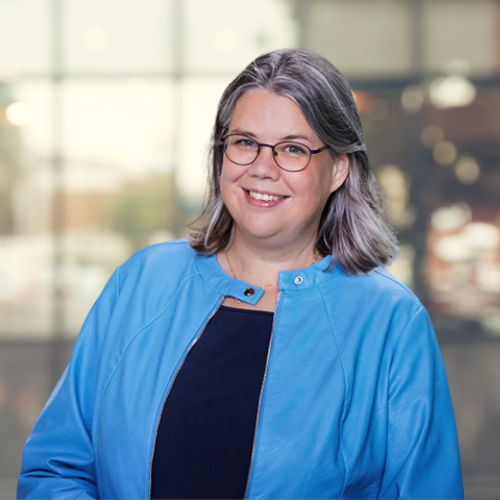
Judith Dijk

Judith is specialised in extracting information from camera images. She now applies the subject of her PhD thesis in Physics, which she obtained 18 years ago, to her work as a research scientist at TNO, including in a research programme on camera systems for the Dutch Ministry of Defence.
Saving people at sea with drones
‘The coastguard often works with drones, to detect people at risk of drowning, for example. The drones are currently still being remotely piloted from the coast and the images are studied by human eyes. We are investigating whether drones can learn, with the help of artificial intelligence (AI), to recognise people in the sea in camera images and report this to the coastguard, which will then send a lifeboat or helicopter to their aid.’
Scientist and programme manager
‘The better we can extract information from the camera images, the more we can do with it. That’s how I contribute to this programme as a research scientist. At the same time, I’m the programme manager of TNO’s Appl.AI programme. I set up research lines in close collaboration with the navy and other units of the Ministry of Defence, so that our innovations are actually aligned with work in the field.’
Autonomous systems
‘All our AI expertise and domain knowledge are combined in the Appl.AI programme to accelerate the process of finding solutions to major social issues. AI has become an indispensable tool and we’re currently making great progress with AI technology for autonomous systems. Going back to the example of detecting people at risk of drowning: drones don’t just have to recognise people in the water. They also have to find their way in an unknown environment, be able to fly safely, and be capable of performing a variety of tasks as independently as possible.
This means that you can only develop such an autonomous system with a multidisciplinary team. You need people with knowledge of computer vision, robotics, human-robot interaction, and simultaneous localisation and mapping, as well as ethicists and lawyers. If everyone helps to think about the project from their own perspective during the creation process, they strengthen each other.’
Following your own path
‘Since January 1, 2022, I am one of the lead scientists of Appl.AI. TNO knew that I wanted to take this step and it gave me space to do so. You can see that TNO considers learning and development important in the way TNO employees interact with each other. You can always go to your colleagues for feedback, and they will support you in planning your personal development. Having the freedom to follow your own path has two benefits. Firstly, employees enjoy doing work that they’re good at. Secondly, because each individual enjoys something different, TNO has a huge amount of in-house diversity and expertise.’
The real world
‘I enjoy doing research – understanding how things work and developing new technology to do it better. At university, I wasn’t as involved in the applicability and social impact of research. That only started at TNO, where you always have the question “What does society need?” in the back of your mind. Of all the things that I could research, what would actually benefit society? That’s very different from the academic world. At university, research questions are neatly defined, but at TNO, you’re dealing with the real world and the unexpected.’
Den Haag - Oude Waalsdorperweg
Oude Waalsdorperweg 63
NL-2597 AK The Hague
Postal address
P.O. Box 96864
NL-2509 JG The Hague
-
Telefoon:+31 88 866 10 00
-
Email:[email protected]